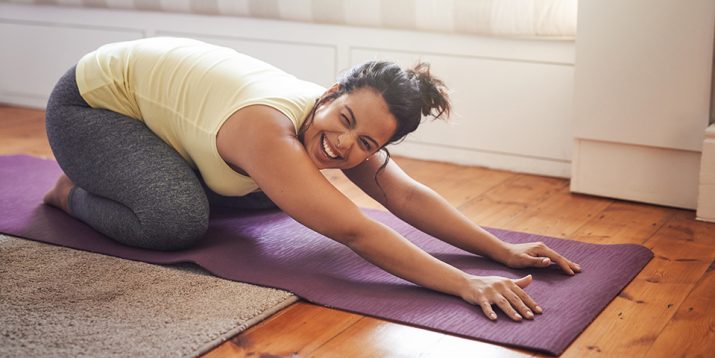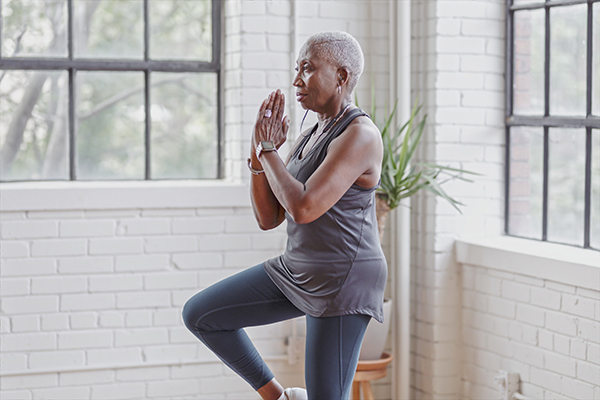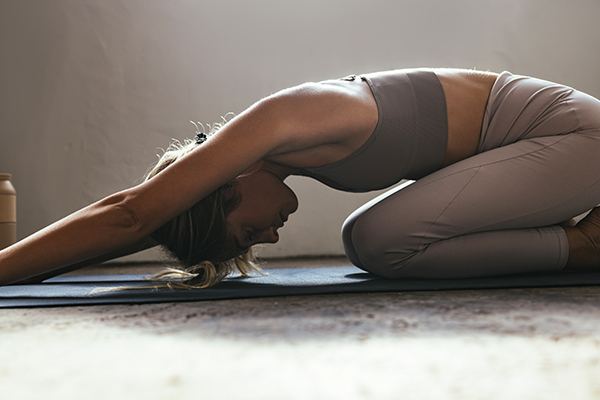Yoga benefits are backed by science and it dates back millennia. This mind-body practice improves balance, flexibility, strength, sleep, and energy levels.

When it comes to yoga, the answer is (almost always) yes. Yes, yoga “works.” Yes, yoga is actually a good workout. Yes, yoga can help with weight loss.
Yes, you can do yoga!
It is quickly growing in popularity — nearly 10 percent of U.S. adults have given it a try.
“Yoga is about balance, in your body, and in your life,” says Yoga52 instructor Micki Duran.
“You gain flexibility and strength. You’ll find it easier to touch your toes or reach behind your back. You’ll walk taller and breathe easier. You’ll set more goals and finish old ones. You’ll gain patience and be more tolerant. You’ll have an easier time being still. You will be more present,” she adds.
And that’s just a small sampling of the benefits of yoga.
“I tell my students that yoga doesn’t just affect your muscles and bones — it affects every single system of your body,” says Ann Swanson, M.S., E-RYT 500.
From your brain to your balance, yoga has plenty to offer your body and your mind.
“After the first class, you can feel the mental benefits of a calmer and more blissful state, and after a week, you can start to see your entire body toning up,” says Yoga52 instructor Marie Grujicic-Delage.
And it gets better.
“With continued, consistent practice, people often experience even deeper benefits,” including an improved overall sense of well-being and quality of life, adds Yoga52 instructor Brent Laffoon.
Whether you’re looking for inner peace, life and mental balance, or just better flexibility, yoga has plenty to offer.
Take a look at the benefits of starting a yoga program and practicing just a few times a week.
More people take up yoga for wellness than for a specific health reason, though healthcare providers are increasingly “prescribing” yoga.
There’s no “one size fits all” practice for all the health benefits of yoga.
“The benefits are immense and varied and differ from person to person,” says Laffoon. “Everybody comes to yoga with their own unique set of circumstances, and part of the beauty of yoga is that it helps each individual learn how to address his or her own situation.”
At the outset, yoga practiced for a stiff neck might look different than yoga practiced for strength or stress relief, but there’s more overlap than you might expect.
“Yoga doesn’t need to be intense to help the body, nor does it have to be gentle to help the mind,” says Duran.
And while you might be drawn to yoga for abs or core strength, it might be the mental benefits of yoga that keep you practicing.
“If you can breathe, you can do yoga and experience its profound benefits,” says Swanson.
In short, yoga is good for life.
19 Benefits of Yoga Backed by Science
Here’s a rundown of the benefits of yoga.
1. Calms the nervous system
Yoga’s focus on breathing is the key to this benefit.
“Yoga directly influences your autonomic nervous system, which is your body’s master control system,” says Swanson. “By calming the nervous system, going into ‘rest and digest’ more often, your body can function optimally and have a greater capacity to heal.”
2. Lowers stress and builds resilience
There’s been significant research into yoga for stress relief. Yoga may be more effective than walking for stress management, and, if you stick with it, you may be able to recover from stress faster.
Yoga can help build resilience — our defense against stress.
“The more we practice, the more we learn to do things simply for the love and joy of doing them, and not for a specific outcome, which often creates stress, discouragement, frustration, anger, even heartbreak,” says Laffoon.
3. May help with anxiety
In research on yoga for anxiety, many studies have shown a significant decrease in symptoms and measurable biomarkers.
When we practice, “the nervous system has the potential to move from ‘fight or flight’ to a more calm ‘rest and digest’ response,” says Sherrell Moore-Tucker, RYT 200.
Yoga has also shown promise for performance anxiety.
4. Boosts mood
As with any form of exercise, yoga “releases feel-good chemicals like adrenaline, serotonin, and dopamine,” says Moore-Tucker.
Yoga may also help shift your perspective, which can in turn boost mood.
Indeed, research shows that the majority of yoga practitioners believe that yoga has a positive impact on their lives. That’s something to feel good about.
5. Contributes to healthy aging
While yoga isn’t a fountain of youth, it can help you age more gracefully. That same survey that observed the mood-boosting effects of yoga saw those benefits extend to those as old as 87 years of age.
And the collective physical and mental benefits of yoga can also help improve quality of life in older adults.
6. Helps with focus and cognition
Yoga teaches you to focus on your form and breath, helping to improve attention and concentration.
A 2015 research review found that yoga improves cognitive function, including focus and processing speed.
“One of the ways that yoga works is by teaching people to slow down and pay closer attention to their bodies and minds,” explains Laffoon. “The combined effect is that people become much more in tune with themselves on all levels — mental, physical, emotional, and spiritual.”
7. Boosts memory
In addition to focus, yoga has been shown to increase “gray matter in key areas of the brain, counteracting the natural effects of aging,” says Swanson, the author of Science of Yoga.
The brains of yogis and meditators also show less of the natural age-related decline in intellectual capacity, and both yoga and meditation have been shown to help lessen cognitive decline to a greater extent than memory training exercises.
8. Helps with energy
Those same chemicals that give you a mood boost also help with energy. Even two minutes of yoga can give you a boost of energy and self-esteem.
9. Helps you sleep better
One in three adults don’t get enough sleep.
In research on yoga for sleep, the practice has been shown to help both men and women catch more Zs.
Indeed, more than half (55 percent) of yoga practitioners report improved sleep (and that’s not counting the naps they take during savasana).
10. Increases flexibility and functional fitness
Just 10 weeks of yoga can significantly improve flexibility, according to a study in the International Journal of Yoga.
The benefits of yoga extend far beyond the mat.
A 2016 study found that yoga is just as effective as stretching and strengthening exercises at improving functional (real world) fitness, improving balance, strength, mobility, and flexibility.
11. May help weight loss
Yoga may help with weight loss, and a 2016 research review found it to be safe and effective for doing so.
Yoga can count as cardio — especially if you do vinyasa yoga — but the research on yoga for weight loss shows positive effects even with restorative yoga.
12. Helps build strength
Yoga is a weight-bearing practice that’s low-impact, and its ability to build strength is among its most important benefits.
Research on yoga for strength shows it can help maintain and build muscle mass.
13. Promotes bone health
The weight-bearing aspects of yoga also help maintain and build bone density.
Research by Dr. Loren Fishman, a physician and yogi, found that even 10 minutes of daily yoga improved bone density in the spine and hip bones.
Another decade-long study showed 12 minutes of yoga a day bolstered bone quality.
14. Keeps joints and connective tissues healthy
Yoga can help with the alignment, flexibility, mobility, and overall health of joints and connective tissues.
“Yoga can help increase the range of motion in all of your joints, as well as create strength around them, so you feel better supported,” says Grujicic-Delage.
And studies specifically on yoga for knee pain show an improvement in both pain and stiffness.
15. Helps with balance
A well-rounded yoga practice can help “improve strength, flexibility, agility, balance, and fall prevention,” says Swanson.
Working on balance throughout your lifetime can help prevent dangerous falls as you age.
Yoga can significantly improve balance by increasing proprioception (awareness of your body’s position in space) and by building strength in your ankles and legs.
16. Supports back and spine health
Yoga’s benefits for your bones and muscles also apply to your back. The practice works your entire core, the primary job of which is to support your spine.
“As you start your practice, your muscles will strengthen and activate, and your spine will be better supported — you’ll have better posture as well,” says Grujicic-Delage.
One study scanned the spines of longtime yoga teachers and found that, when compared to non-yogis, their spines showed less degeneration of the discs.
17. Helps with pain
Numerous studies suggest that yoga be effective for reducing acute neck and back pain. “Back pain is one of the areas where yoga shows the most promise,” says Swanson. “Research suggests that yoga is not only effective, but also cost-effective when it comes to back pain.”
For pain in the lower back, yoga has been found to help even severe, chronic pain.
18. Supports healthy blood pressure and cardiovascular health
The benefits of yoga extend to the heart, too.
The practice may help manage blood pressure and improve heart function “including heart rate variability, which may be a measure for cardiovascular and nervous system resilience,” says Swanson.
19. Can help improve fertility success
“Yoga can help with fertility,” says Duran, and a 2017 review of studies found that the stress-relieving benefits of yoga might be to thank.
While there’s no magic “fertility yoga pose,” the practice “produces clarity of mind, a more positive outlook, and more patience,” which can help couples improve their chances of conceiving —a nd of the success of fertility treatments in particular, says Moore-Tucker.
How to Start Your Yoga Practice
So now you know: Yoga is good for you. Are you ready to actually feel the benefits in your own life?
Commit to doing at least one full yoga class a week for a year (52 weeks).
You can do more than one, but the minimum for reducing stress, increasing flexibility, reducing pain, and getting strong is one 30- to 45-minute yoga class per week.
Yoga52 is a collection of 52 yoga classes for beginners to experts taught by five of the world’s leading yoga instructors.
These classes can help you reduce stress, build strength and flexibility, and improve balance while shaping your body as only yoga can.
From the Beachbody On Demand Blog –







